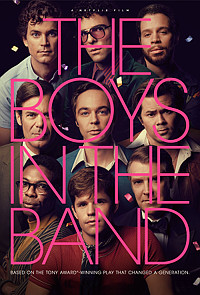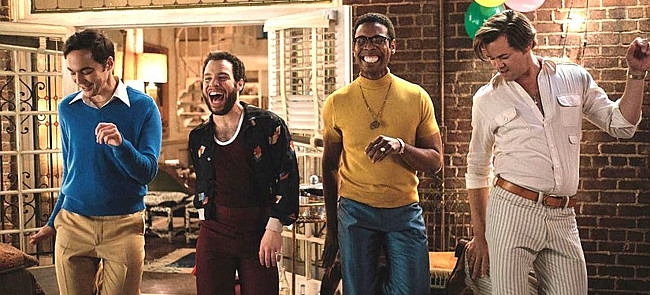| SHADOWS ON THE WALL | REVIEWS | NEWS | FESTIVAL | AWARDS | Q&A | ABOUT | TALKBACK | |||||
|
The Boys in the Band
Review by Rich Cline |
| |||||
 dir Joe Mantello scr Mart Crowley, Ned Martel prd Ryan Murphy, David Stone, Joe Mantello , Ned Martel, Alexis with Jim Parsons, Zachary Quinto, Matt Bomer, Andrew Rannells, Charlie Carver, Robin de Jesus, Brian Hutchison, Michael Benjamin Washington, Tuc Watkins, Brian Dole, Mark Thomas Young, John DeLuca release US/UK 30.Sep.20 20/US Netflix 2h01 


Is it streaming? |
 Mart Crowley's iconic play, first adapted on film in 1970, is back with the significant addition of an all-queer cast. And they certainly know how to deliver this snippy dialog, revealing deeper thoughts and feelings beneath the riotous banter. Sharply directed, the story unfolds in real time in one location. Much of what is said is downright cruel, but this is a rare script that confronts enormous issues without flinching. In 1968 New York, Michael (Parsons) is frazzled preparing for a birthday party, dreading an evening with six screaming queens. Donald (Bomer) turns up early. Emory (de Jesus) arrives with bickering couple Larry and Hank (Rannells and Watkins). And Bernard (Washington) gets disapproving looks on the Subway ride there. Then Michael's straight old university friend Alan (Hutchison) shows up out of the blue, and it's rather impossible for everyone to tone down their camp behaviour. But there's another surprise with the arrival of dopey rentboy Cowboy (Carver), a present for sardonic birthday boy Harold (Quinto). The dialog is a barrage of witty references and biting comments, augmented by the period adds a strong edge to the conversations, because these men are in a safe space at a time when they could never drop their guard in public or even with their families. So when Alan arrives, Hank refers to Larry as his roommate, which only provokes another catty argument. And when Alan calls Emory a "pansy", Michael bites his tongue. But as the evening continues, each man is forced to face the truth about his life. Quinto relishes his role as the provocateur whose cynicism knows no bounds. Parsons' Michael matches him with lacerating wit, but reveals a more emotional soul under the snap, and his scenes with Bomer's observant Donald have a bracing authenticity. Each of the actors gets a number of stand-out moments, adding layers to the characters. This undermines stereotypes to explore complex angles to these men as they play a game that involves an expression of love. While insults are perhaps laid on too thickly, this extended conversation touches on salient themes that still resonate 50 years later, from religious and racial issues to the impact of subtle bigotry both in society at large and within queer subculture. It's also a timeless exploration of the contrast between how we act and what we think. And it makes a powerful comment on the legacy of marginalised people who have been taught all their lives to hate themselves.
R E A D E R R E V I E W S 
 Still waiting for your comments ... don't be shy.
Still waiting for your comments ... don't be shy.
|
||||
© 2020 by Rich Cline, Shadows on the Wall | |||||
| HOME | REVIEWS | NEWS | FESTIVAL | AWARDS | Q&A | ABOUT | TALKBACK | |||||

